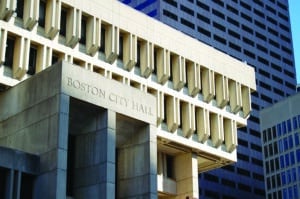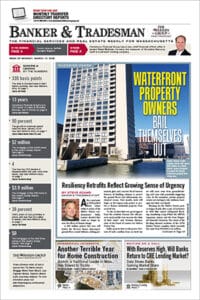Boston’s Zoning Commission rejected the Wu administration’s attempt to limit carbon emissions in new developments last night in a surprising turn of events.
The changes had been set to go into effect in July 2025, part of the city’s goal to reduce fossil fuel use and emissions in the building sector. The commission voted 6-4 in favor of the proposal, short of the two-thirds majority required.
Commissioner Michael DiMella pressed City Hall staffers on how much emission reductions would be attained by the limits for new projects.
“The market is extremely difficult to develop and build now. We have a massive housing crisis that is an immediate need for the city,” said DiMella, the Greater Boston Real Estate Board’s representative on the board. “That is a major problem, and adding more costs…is making it very difficult to develop in the city.”
Real estate industry groups had objected to the timing of the new requirements, saying they would add another cost burden during a widespread downturn in office, lab and multifamily construction that’s also seen construction and borrowing costs escalate dramatically.
Emily Jones, deputy director of Local Initiatives Support Corp. Massachusetts, said the new regulations would make it harder for affordable housing developers to finance projects. She cited the example of a 96-unit project that would incur an additional $27,000 in annual operating costs if the zoning were approved.
City climate studies estimate that the building stock is responsible for over two-thirds of carbon emissions. The policy is designed to attain city-wide net zero carbon emissions guidelines by 2050, said Oliver Sellers-Garcia, one of Wu’s top climate policy advisors.
“Zoning is one of the tools that is going to help with the slice of emissions that come from new buildings,” Sellers-Garcia said.
In June, the Boston Planning & Development Agency board of directors approved the strict new limits on carbon emissions which would apply to developments which are submitted for approval beginning in July 2025. Typically, a BPDA board vote is the main gate zoning and other policy proposals must pass through, with other city boards typically following suit.
The net-zero zoning code applies to projects that include at least 15 housing units or 20,000 square feet of construction, and additions to existing buildings of 50,000 square feet or more.
Existing buildings already need to reduce greenhouse gas emissions or pay into a city fund under the implementation of Boston’s Building Emissions Reduction Disclosure Ordinance.
The net zero zoning ordinance follows a similar path. Developers could comply by using electric or solar utility systems, purchasing renewable energy credits or submit alternative compliance payments to the city’s equitable emissions investment fund, which supports decarbonization in environmental justice communities. The BPDA has estimated compliance payments could add up to 5.5 percent to a property’s overall operational costs.
The proposed code set later deadlines for higher-energy building types such as labs, which would have been given until 2035 to comply, while hospitals and manufacturing buildings faced a 2045 deadline.
Commissioner Drew Leff questioned whether the new zoning code is needed, given the BERDO requirements which apply to completed buildings.
“Developers know the buildings have to get there over this timeline that has been set up and agreed upon,” Leff said.
Kathleen Onufer, deputy director of zoning for the Boston Planning Department, responded that the zoning amendment is designed to make developers think about sustainability early in the design process.
The Zoning Commission vote is the final step that amends the zoning language. A spokesperson for Mayor Michelle Wu said the administration plans to resubmit the proposal “to address some of the concerns commissioners raised.”









